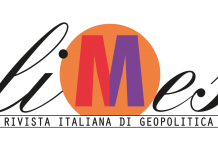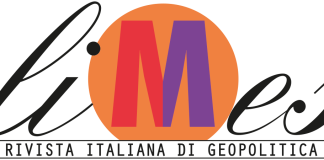by Germano Dottori
This article appears on Limes n. 7/2023, «Il Gran Turco», at this link.
1. The nature of the relationship between Italy and Turkey eludes most citizens and many politicians in Italy. In fact, in Italy, the perception of mutual power relations is affected by die-hard cultural prejudices. The memories of the Cold War certainly weigh on the older generation. It was a period in which Turkey was essentially seen as the extreme south-eastern bastion of the Atlantic Alliance and thus of the West, rather than the centre of a world of its own. Moreover, this view was also a reflection of the self-representation of the Turks, to some of whom the bipolar system must have seemed a kind of prison separating them from much of their former Central Asian and Middle Eastern sphere of influence.
The bulk of Italian society suffers from a typical declination of the economicist approach. It reduces power to wealth, neglecting other fundamental components such as national ambitions and the will to matter, as well as the structure of interest representation. Following this peculiar logic, because the Turks are poor and the Italians are not, the Italians would inevitably be stronger than the Turks. As if the differences of institutional set-up and the willingness of ordinary people to bear the costs of prestige politics did not matter.
For a long time, the Italians even imagined favouring Ankara joining the European Union. Not only to please the United States, which wished it, but also because the Italians cultivated the illusion of enlisting the Turks in a scheme to enhance Mediterranean Europe from which Italy would have emerged strengthened. In this sense, Turkey would have been Rome’s junior partner in the Mare Nostrum.
The Italians realised that things were not quite as they were in the autumn of 1998, when the leader of the PKK, Abdullah Öcalan (a.k.a. Apo), arrived in Italy in search of political asylum to protect him from the arrest warrant Turkish judges had issued against him. Öcalan landed in Italy on 12 November, accompanied by Communist Refoundation MEP Ramon Mantovani. And many hopes.
As we know, it ended badly. Ankara foreshadowed the cancellation of all Turkish orders from companies in Italy and this threat was enough to convince the Italians that Öcalan could not stay with them. Apo was persuaded to leave for a third country and on 16 January 1999 he boarded a plane for Kenya. There less than a month later he was met by emissaries from the Turkish services to be taken back home. He avoided the death penalty, but is still serving a life sentence. In those days almost a quarter of a century ago, it became clear who, between the Italians and the Turks, was really the stronger. And Recep Tayyip Erdoǧan had not yet arrived. But the lesson was learned and all subsequent Italian governments took a much more cautious attitude towards Turkey.
2. Since then, the profile of Turkish foreign policy has risen considerably. Ankara has tried to resume the role that its rulers felt was its due throughout the Ottoman space and wherever languages akin to Turkish are spoken. It thus developed a very aggressive and sometimes unscrupulous multi-vector strategy along the lines imagined by Ahmet Davutoǧlu. As the new Turkey has taken to casually using all components of political power (including the manipulation of migratory flows, if necessary) to elevate its status, expand its sphere of influence and fragment others’, Italy has preferred to adapt. Rome has agreed to regulate the pursuit of its national interests in a non-antagonistic manner vis-à-vis Ankara, even incorporating significant self-limitations into its own foreign policy in a number of scenarios. In some ways, Italy has been a supporting actor for the Turks in many theatres of common interest, taking note of their greater political-strategic strength and discounting a prominence that seems in no way to be affected by the growing difficulties afflicting their economy.
The recent presidential elections proved to those who still had doubts that the Turks are willing to accept even triple-digit inflation in the name of Erdoǧan’s ambitious international agenda. In short, they are practically the Italians’ antithesis. Turkey is a power because it wants it, even paying the inevitable price. Italy and the Italians do not want to be a power. This has been seen in many areas, starting with the eastern Mediterranean, where Italian policy can be entirely summed up in a slogan: Türkiye First.
Italy’s relationship with Greece is primarily affected by this dynamic. It has never been especially warm and is now probably close to a low point despite the recent agreement by which the two countries delimited their respective Exclusive Economic Zones (EEZ). Athens, which has often been let down by Washington and now has no leverage in Moscow, has protected itself by turning to France. Paris generously sells it weapons and sided quite firmly with it during the exploration crisis that erupted in the summer of 2020, sending its Mirages to Crete.
Italy in turn is linked to France by the binding Quirinal Treaty, which also provides for extensive forms of prior consultation regarding the two countries’ respective international policies. In spite of this, and in spite of the fact that Italy was already close to the Hexagon even before the agreement that amalgamates the two ‘Latin sisters’ was negotiated and stipulated, Rome has always distanced itself from any initiative the French took against Ankara’s interests. And the fact that Italy does not accept being amalgamated by Paris in anti-Turkish schemes has recently been reiterated unofficially but directly.
3. Italian diplomacy is also very cautious in matters of energy. The Russo-Ukrainian War has forced the Italians to free themselves from supplies from Moscow, reorienting their entire supply strategy. This has led them to explore projects that are less exposed to any kind of direct or indirect Kremlin conditioning. However, the Italian government is still very wary about the EastMed (the so-called ‘Pipeline of Democracies’) – which would bring Cypriot and Israeli methane to Greece and Italy – because it is opposed by Turkey.
The original wording of a recent directive voted by the Foreign Affairs Committee of the Italian Chamber of Deputies was amended precisely to make Italian action against the construction of this infrastructure of interest to (Italian energy company) Edison conditional on Ankara’s prior consent. In fact, one day Ankara might even adhere to it, but in order to set itself up as a major energy hub between the Mediterranean and the Black Sea, significantly altering the pipelines’ geopolitical significance. The CEO of the Italian energy company ENI, Claudio Descalzi, also took the same line: yes to EastMed only if Ankara joins. The United States itself has obliquely made it clear, between position takings and retractions, that it is not enthusiastic about an initiative that could further alienate the Turks from the West.
Significantly, at least for now, to the EastMed gamble, the Italians prefer deepening relations with Algeria, a country that is heavily dependent on Russia for military procurement and has unilaterally proclaimed an EEZ that reaches as far as the coast of Sardinia, often sending submarines to garrison its northern limit.
4. Another dossier on which Italy has given ground to Turkey is undoubtedly Libya. What happened in the Italian former colony is in some ways the most striking manifestation of the relative weakening suffered by Rome vis-à-vis Ankara and the instrumental causes behind it. There were two key moments.
The first was the Agreement reached on 27 November 2019 by which Erdoǧan and the then Premier of the Government of National Accord (GNA) in Tripoli Fayiz al-Sarraj demarcated the EEZs of their respective countries, establishing their contiguity and cutting across the Mediterranean along a north-east/south-west axis. A bilateral military protocol was also signed, which was referred to in a second step. That is, when on 19 December of the same year, Tripoli turned to all of its allies for assistance in the face of the onslaught of General Halifa Haftar’s militias. The Turks responded positively by sending military instructors and militiamen chosen from Syrian civil war veterans to the Libyan capital. A letter also reached Italy, but Italy reacted negatively. Al-Sarraj subsequently complained about this on more than one occasion.
During 2020, the year in which Haftar failed to conquer Tripolitania, as many as 172 planes loaded with Turkish military aid arrived in the part of Libya loyal to GNA. Italy’s completely different policy was announced in these terms by the then Foreign Minister Luigi Di Maio during a briefing to the Italian Parliament on 20 January 2022: non-existence of military solutions to the crisis; criticism of foreign intervention in Libya; primacy of the diplomatic route and refusal, dictated by the Constitution, to use Italian troops to achieve greater influence in Tripoli.
Ankara already enjoyed considerable advantages in Tripolitania, such as the presence of its own ethnic minority in Misrata and the closeness of the GNA of the time to the family of political Islam. But Italy’s response to al-Sarraj’s call for aid, so different to Turkey’s, made the gap practically unbridgeable, forcing Italy into a subaltern role and the permanent pursuit of diplomatic acrobatics without the indispensable military support.
Di Maio’s declarations, which were widely acclaimed in Parliament, made it generally known that Italy’s support encounters precise limits precisely in the circumstances in which it would be most valuable and could guarantee meaningful political returns: that is, in the moment of greatest need. This is a fact that seems impossible to remedy in the short term, stemming from an illusion strongly rooted in Italian political and strategic culture: that Italy has no real enemies and the force at its disposal can only be used to interpose itself between opposing parties that allow it to or under the banner of a multilateral security organisation. Too little, evidently, in these times marked by American retrenchment and the resumption of the power contest at all levels.
In a similar vein, Italy has also lost Somalia to Turkey. Yet for years Italian soldiers have been engaged in various missions under the aegis of the European Union, whereas in neighbouring Djibouti there is Italy’s only military base abroad. A base that Rome has just used to evacuate Italians trapped in the unrest that broke out in Sudan.
5. Unlike the Turks, the Italians do not think strategically even when considering how to protect their main current interests. They do not act as a system and are almost always reactive rather than proactive, leaving competitors and potential rivals to dictate the agenda and enjoy the advantage of the initiative. At best, this inevitably condemns the Italians to make the most of their weaknesses and low profile. To benefit from not being perceived as a danger, as suggested by Egidio Ivetic in his recent brilliant essay on Italy’s ‘supporting actor’ centrality in the Mediterranean.
In Italy’s relations with Turkey, all this means accepting Turkey’s geopolitical superiority. It also means Italy contenting itself with negotiating the minimum conditions for the protection of its essential national interests on a case-by-case basis, while waiting for the United States or whoever for it to return one day to guarantee the Italians from those the Italians fear.
Translated by Dr Mark A. Sammut Sassi




 Special Collection – The Middle East
Special Collection – The Middle East